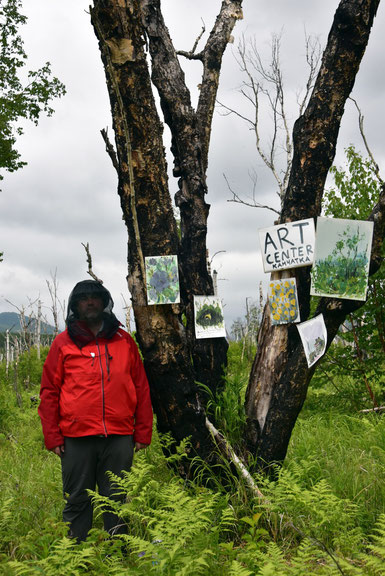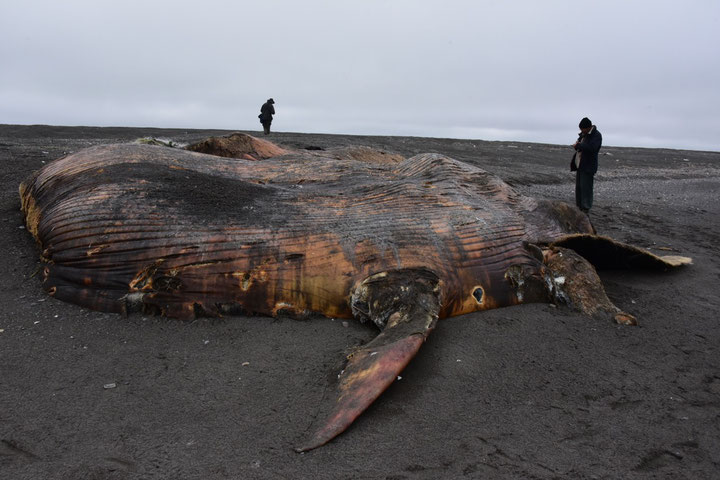Issue 4/2017 - Global Limits
Alternative Realism
Interview with Cultural and Media Studies Scholar McKenzie Wark on Social Challenges of the Anthropocene
Cultural and media studies scholar McKenzie Wark, who teaches at the New School in New York, has previously attracted attention with highly productive books on Situationism, as well as Gamer Theory and A Hacker Manifesto. His book Molecular Red. Theory for the Anthropocene, recently translated into German, elaborates one of the most highly advanced theories on the Anthropocene and climate change. Wark examines a re-formulation of critical thinking and alternatives rather than speculative realism: “one which sticks close to the collaborative labors of knowing and doing. One which opens toward plural narratives about how history can work out otherwise. A realism formed by past experience, but not confined to it.”
Seeking to refocus attention on the realism of work, practice, the apparatus and infrastructure, the sources he draws on include Russian revolutionaries and authors Alexander Bogdanov and Andrei Platonov, cyborg and Technoscience expert Donna Haraway, as well as sci-fi author Kim Stanley Robinson (and indeed Paul Feyerabend and Karen Barad). Far from wallowing in retrograde nostalgia, Wark’s unorthodox approach to the archive enables him to highlight new connections and render these productive. He identifies potential for resistance in what seems jaded and outgrown, making it fruitful in the here and now.
Pascal Jurt: The subtitle of your book Molecular Red suggests a Theory for the Anthropocene. But your reflection upon “the Anthropocene” is very different from classical liberal reflections such as those of Bruno Latour. You refer to Marxists like Bogdanov and Platonov, Donna Haraway and to sci-fi authors such as Kim Stanley Robinson. Why should science fiction offer a productive means of addressing the possibility of an impending environmental catastrophe in the present?
McKenzie Wark: I wanted to revive that line of critical theory that is centered on labor and technology, and which connects to both science and speculative writing about science. There are two approaches there, which I think complement and correct each other. One is thinking about science not in terms of its results but in terms of its procedures. Science is a special kind of labor in the world. The other is thinking about the possibilities that labor opens up, both its dangers and its promise. Speculative writing, including science fiction, is very helpful to that task.
Indeed, where I differ from Latour is in treating science and technology as kinds of labor that have a certain priority. I think it's important to try to see it from the point of view of the sciences involved.
Jurt: Philosopher and scientist Alexander Bogdanov and his “tektology” lie at the heart of Molecular Red. Are you proposing a kind of Marxist “new tektology” that would be similar to climate science, which you refer to as a sort of meta-science?
Wark: Marxist thought is now often treated as a branch of philosophy, political theory or economic thought; I wanted to show that there is a less well-known strand that tried to learn from the scientists rather than ignoring them, or worse, legislating for them. Bogdanov is a fascinating, neglected figure. He is an early proponent of systems thinking. He grasped early on that the coordination of different kinds of labor and knowledge is a huge problem, maybe more so than the procedures of individual forms of knowledge.
Jurt: Another reference is Platonov, who also revealed theory through fantasy and deprivation, although Bogdanov’s empiricism and positivism seem very different from Platonov’s “negative dialectics”. Can the two Russians really connect and how?
Wark: Bogdanov initiated the Proletkult movement, actually just before the October Revolution (to which, like most Marxists of the time, he was opposed). Proletkult was about how labor could organize not just itself but the whole of the social and natural metabolism within which we live. Platonov was a member of a Proletkult group. He quit writing for a while to work in electrical and hydrological engineering. He had a much more realistic view, born of practice, of how difficult organizing labor and knowledge is. He is really a writer for our time, for the Anthropocene.
Jurt: What is the “Carbon Liberation Front,” a protagonist and enemy you introduce in your book? Why are these “villains” given such a positive-sounding name?
Wark: It's meant to be ironic. Of all the great liberation movements of the modern era, the one that succeeded was one that did not liberate a class or a gender or an oppressed nation. It liberated an element—carbon, or rather carbon compounds—so that they may be free anarchists in the biosphere!
Jurt: You propagate a “low theory,” based on everyday experience instead of philosophy in a stricter sense of the term as a lofty “high theory” and you are also very critical of its proponents who are very enamored of the lovely things of their bourgeois class. Reviewers have been quite critical of this antagonism, which has been deemed too simple for a complex analysis of society, so why do you think it is still necessary today?
Wark: It is one of the great alibis of high theory to say “it's more complicated.” It's a great defense of the existing order. Critical theory as practiced in the university, and particularly in Germany, is essentially bourgeois. If we are going to actually do something about the Anthropocene, it's going to take a different kind of theory-making. One that makes simplifying assumptions in order to save time and move on with the agenda.
Jurt: You write that “what we need is an alternative realism. One which sticks close to the collaborative labors of knowing and doing.” How can this alternative realism not be perceived as escapism in the face of the very realistic, non-alternative threat of climate change et al? Can you elaborate on this?
Wark: I don't see how one is at variance with the other. A realism that takes organized social activity as its object and medium is precisely what you need to grasp how a political economy based on exploitation and the ever-expanding production of exchange values destroys its own conditions of existence. But we are told with increasing amounts of coercion that there can be no other reality than exchange value. So one has to insist on how unreal such a political economy actually is. It falls short of the world. Speculative thought is not the opposite of realism, particularly in a society that pretends it is “real” but really isn't. One needs a speculative approach to find the real components of the world left out of the amputated realism governed by exchange value.
Jurt: “The Anthropocene is a series of metabolic rifts,” you write, “where one molecule after another is extracted by labor and technique to make things for humans, but the waste product doesn’t return so that the cycle can renew itself.” What does this mean in detail and what are the consequences?
Wark: The first part is being open to what the earth sciences have to say about that, and not rushing in to “critique” them, as if those of us from other fields knew better. is curious how the philosophy of science has a lot to say about physics, but not so much about the earth sciences. Thinking through what advances in the earth sciences mean for other fields of knowledge ought to be a priority field of work. But one can’t stop there. Here we get into something sciences is not designed to do, which is to ask questions about what this means for social, political, or cultural change. The scale and depth of the transformation of all our social-technical systems that’s required is really staggering. So we need to get on with it. All kinds of knowledge and labor need to commit themselves to a common task, rather than just seeing what is in it for their own discipline. We need a revolution in how knowledge is produced and organized.
Jurt: For all the readers who are not yet familiar with your book, how would you define “metabolic rift” in a few words?
Wark: Well, I got the term from John Bellamy Foster. We are used to thinking of our own bodies as metabolisms. One can extend the metaphor to include the whole process of social and natural life. It’s about getting away from the habit of thinking of nature as something separate or external, as an “environment” or background. One can then think of a social-natural process that has become highly unstable. It can no longer be assumed that it would revert to some sort of equilibrium if we just refrained from meddling with it. That may no longer be possible. That’s what the Anthropocene means.
Jurt: Today, we find an abundance of diagnoses of the inner workings of the Anthropocene. What sets your diagnosis apart from current critical discourses such as Capitaloscene, Chthulucene and Timothy Morton’s “ecology without nature?”
Wark: I think it was useful of Timothy Morton to peel apart these concepts of ecology and nature, as they’re not the same. But I went in the other direction: nature without ecology. If by ecology we mean homeostasis or cycle, then that’s the term to discard. The natural world is not like a market seeking equilibrium, which is after all where the metaphor of ecology comes from. The impossibility of equilibrium is the thing that has to be faced. My objection to calling it the Capitalocene is firstly that I find it a bit arrogant. The earth sciences discovered the Anthropocene and that gives that field naming rights. It’s true enough that capitalism is the problem. But ending it is not in itself the solution. If capitalism ended tomorrow, we’d still have the problem of feeding and housing seven billion people without tipping the planet into runaway metabolic rift. I’m closer to Donna Haraway in some regards, and I appreciate the work she is trying to do with the Chthulucene, but I wanted to stay closer to the question of labor. What does it mean to organize human life alongside other lives, woven as we are with our tech, in ways that can be ongoing? For me, the labor point of view is the starting place. How are we to organize all of our different kinds of labor as a collaboration with the earth?
Jurt: In Molecular Red, Bogdanov’s and Platonov’s closest contemporary analogues are Donna Haraway and Kim Stanley Robinson. Why?
Wark: The book is in two parts. The first is about a civilization that failed: Soviet civilization. The second is about another civilization that will fail: American civilization. It’s not the Cold War story, where we won and they lost. It’s a story about how they failed, and since we’re failing, we might learn from their failure. Both Soviet and American civilizations were built at an unprecedented scale. That might have lessons for what is now a problem with even more challenging scale dimensions.
I was interested in how one can think about these things using both concepts and stories. It’s about two kinds of speculative writing. I think the most interesting versions of speculative thinking about the problem of a natural-social metabolism for our times are in Bogdanov and Platonov. They are different versions, one more optimistic than the other, about how social labor might organize a world for itself. Bogdanov was erased from the Soviet story. It did not help that Lenin always considered him a rival. And Platonov’s major works were not known in his time. They’re defeated figures from a civilization that was defeated in turn.
So where do their ideas find resonance? I chose two Californians who seem to me to have revived, in a more contemporary form, the question of how speculative writing can contribute to organizing the world otherwise.
Jurt: Are you a Communist?
Wark: I would say I am an “a-Communist,” in the way one says one is an atheist. An atheist knows there is no God, but the term is still defined in relation to that non-existence. In the same way one can be an a-Communist: it doesn’t exist, but still one is defined in relation to that impossibility. But it is very clear now that capitalism is even more impossible. It is just the death drive, speeding to its end and taking us with it. So we need something else. Something made out of the fragments of these impossibilities, perhaps. We can start building a new civilization right now, in the ruins of this old one. This one we all know is not built to last.
Jurt: The so-called “acclerationists” say now it is time to anticipate and accelerate, time for anastrophism and not catastrophism. What do you think about this strategy?
Wark: It seems to involve a willful ignorance. If one is paying attention to the sciences, one really has to pay attention to the earth sciences among them. And the news from there is not good. One can’t just pretend that is not happening and return to what are really rather old-fashioned ideas about speeding up the machine. That said, I’m not a romantic. I think we’re going to need new technologies. We need solutions that will scale. Kim Stanley Robinson thinks the adversity of getting through the bottleneck of the Anthropocene could accelerate social, technical and cultural change. I’m not so optimistic. But let’s give it a go.
https://www.versobooks.com/books/2288-molecular-red
https://www.matthes-seitz-berlin.de/buch/molekulares-rot.html




